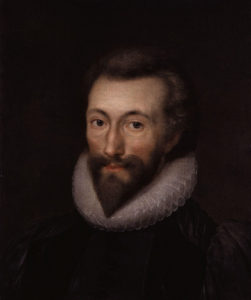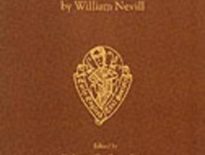 John Donne was born in 1572. His exact birth date is not known but is estimated to be between 24th January and 19th of June. He is remembered for his emotive poetry, religious writings and his skill as an orator.
John Donne was born in 1572. His exact birth date is not known but is estimated to be between 24th January and 19th of June. He is remembered for his emotive poetry, religious writings and his skill as an orator.
John Donne was born a Roman Catholic and was a direct descendent of Sir Thomas More’s sister. His mother was the niece of Thomas More and the youngest daughter of John Heywood, a playwright. His father was a prosperous merchant with Welsh ancestry who died when Donne was four years old. His mother remarried Dr John Syminges, who became stepfather to Donne and his siblings. Donne was an exceptionally well educated young man, attending Oxford University at the age of eleven in 1583, where he resided and studied for three years. He later attended Cambridge University where he continued further study. However, due to his Catholicism, he could not obtain a degree, as the religion was illegal under Elizabeth I. Donne also refused to swear the oath of allegiance to Elizabeth, which was also needed to graduate. Following his time at Cambridge, Donne was accepted into the Thavie’s Inn Legal School where he began the study of law. During this time, his brother Henry was arrested for harbouring a Catholic priest, and he died of the Bubonic Plague while in prison. It is thought that this event resulted in Donne questioning his faith.
During and following his studies, Donne liked to travel, and in 1596 he enlisted to fight against the Spanish at Cadiz, alongside Sir Walter Raleigh and the Earl of Essex. Following his return to England, Donne was appointed as secretary to Sir Thomas Egerton, a prominent courtier and he remained in the post for five years. His appointment in a Protestant court suggests that Donne had renounced Catholicism.
While secretary to Thomas Egerton, Donne fell in love with Anne More, daughter of Sir George More, Chancellor of the Order of the Garter. The two married in secret and, for this, Donne was arrested and imprisoned, dismissed from his post as secretary, and he was denied Anne’s dowry. This secret marriage ended what was potentially a glittering career. Donne was released from prison, but his reputation was ruined and he lacked any sort of income to support his new wife. Donne and Anne moved to the countryside in Surrey where Donne worked as a lawyer and assistant to Thomas Morton writing anti-Catholic pamphlets. Following the death of Elizabeth I, Donne began to seek patronage for his poetry from nobles at the court of King James I, one of whom, Sir Robert Drury, gave Donne and his family a large apartment in Drury Lane. For Morton, Donne wrote a series of anti-Catholic polemics: ‘Pseudo-Martyr’ and ‘Ignatius His Conclave.’ He also composed works on theology, love and religious poetry. Through his work for various patrons, Donne hoped that he would be given a place at court, having been elected as an MP in earlier years, and again as MP for Taunton in 1614.
James I was impressed by Donne and his work; however, he refused to accept him back at court, encouraging him instead to take holy orders. In the year 1615, after much deliberation, Donne was ordained as a priest for the Church of England. Donne was soon made royal chaplain and received at the command of James I an honorary divinity degree from Cambridge. In 1617, however, personal tragedy befell Donne, with his wife, Anne, dying while giving birth to their 12th child, who was sadly stillborn. Donne’s grief was all-consuming, and he vowed never to marry again, leaving himself in the precarious position of raising his family on a modest salary. However, the death of his wife resulted in John becoming fully committed to his life as an Anglican priest. In 1621, Donne was announced as the Dean of St Paul’s Cathedral, the height of his career. Donne channelled his personal grief into his sermons, becoming an impressive preacher. His skill at preaching resulted in his reputation as the foremost preacher in all of England as he became a firm favourite of James I and his son Charles I.
In 1623, Donne became increasingly unwell with what we believe to be typhus, and his illness was soon reflected in his sermons. In February 1631, John left his bed to preach what would be his final sermon at court. It was posthumously named “Deaths Duell” and it appears to be his own funeral oration. John Donne died on 31st March 1631. A marble effigy survives in St Paul’s commemorating this great poet and religious figure.
John Donne, however, was not overly famous for his poetry during his lifetime, not publishing the vast majority of his work. His work was only appreciated contemporarily by a small number of people. The works we have today are from manuscripts passed through the hands of admirers who recognised Donne's skill and innovative departure from the atypical 16th-century poetry. His work remained relatively ignored until the 1800s, when it began to garner the appreciation it so readily deserves, with appreciation for his work gaining momentum in the 19th and 20th centuries, with T.S Elliot praising Donne and hailing him as an early modernist.
Below is an excerpt of a poem by John Donne titled ‘The Canonization.’ This is a love poem, but one which perfectly depicts how Donne permeates his poetry with religious imagery and motifs, combining the sanctity of religion with the sanctity of love.
For God's sake hold your tongue, and let me love,
Or chide my palsy, or my gout,
My five grey hairs, or ruined fortune flout,
With wealth your state, your mind with arts improve,
Take you a course, get you a place,
Observe his honour, or his grace,
Or the king's real, or his stampèd face
Contemplate; what you will, approve,
So you will let me love.
Alas, alas, who's injured by my love?
What merchant's ships have my sighs drowned?
Who says my tears have overflowed his ground?
When did my colds a forward spring remove?
When did the heats which my veins fill
Add one more to the plaguy bill?
Soldiers find wars, and lawyers find out still
Litigious men, which quarrels move,
Though she and I do love.
Article by Georgia Whitehead
Georgia has just finished her masters in Classics at the University of Edinburgh. Academically, Georgia is interested in early Christianity, with her master's thesis focusing on "The Male Gaze and Self-Representation in Female Christian Narratives". In addition to her interest in ancient history, she has always been an avid lover of the Tudor era, drawn to the magnificence of the Tudor courts and the larger than life characters. She is particularly interested in The Reformation, Christianity and the shifting sands of ecclesiastical politics in this period and also has a keen interest in the lives of Tudor women. It is Georgia's ambition to become a writer, perhaps publishing her own Tudor novel one day.
Bibliography
- G. Keynes, A bibliography of John Donne, dean of Saint Paul's, 4th edn (1973).
- D. Colclough, Donne John, (2011).
- Poem taken from https://www.poetryfoundation.org/poems/44097/the-canonization
Portrait: John Donne by Isaac Oliver.


Leave a Reply